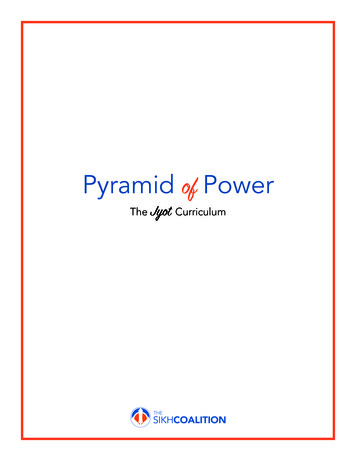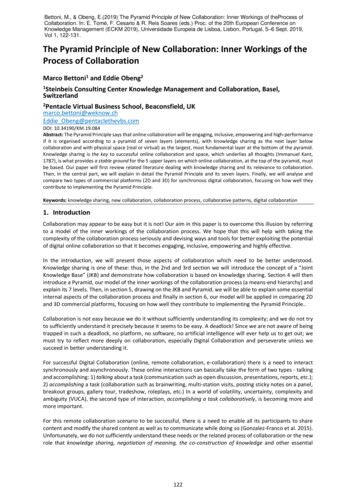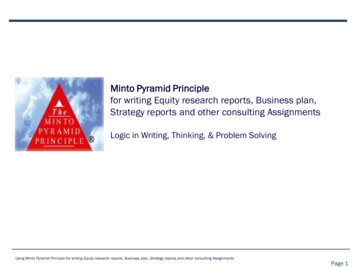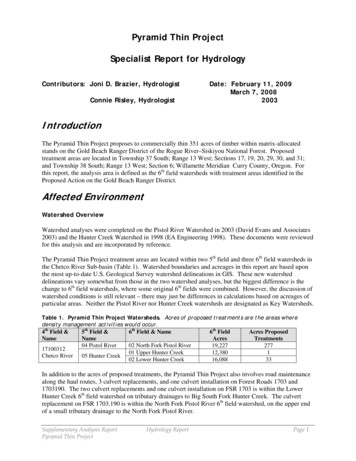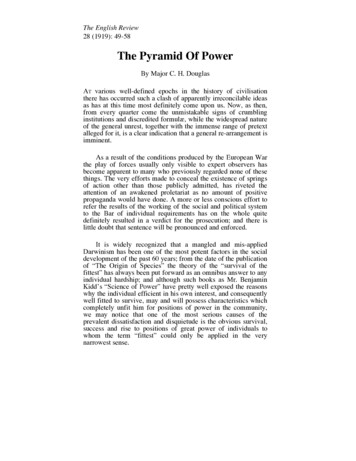
Transcription
The English Review28 (1919): 49-58The Pyramid Of PowerBy Major C. H. DouglasAT various well-defined epochs in the history of civilisationthere has occurred such a clash of apparently irreconcilable ideasas has at this time most definitely come upon us. Now, as then,from every quarter come the unmistakable signs of crumblinginstitutions and discredited formulæ, while the widespread natureof the general unrest, together with the immense range of pretextalleged for it, is a clear indication that a general re-arrangement isimminent.As a result of the conditions produced by the European Warthe play of forces usually only visible to expert observers hasbecome apparent to many who previously regarded none of thesethings. The very efforts made to conceal the existence of springsof action other than those publicly admitted, has riveted theattention of an awakened proletariat as no amount of positivepropaganda would have done. A more or less conscious effort torefer the results of the working of the social and political systemto the Bar of individual requirements has on the whole quitedefinitely resulted in a verdict for the prosecution; and there islittle doubt that sentence will be pronounced and enforced.It is widely recognized that a mangled and mis-appliedDarwinism has been one of the most potent factors in the socialdevelopment of the past 60 years; from the date of the publicationof “The Origin of Species” the theory of the “survival of thefittest” has always been put forward as an omnibus answer to anyindividual hardship; and although such books as Mr. BenjaminKidd’s “Science of Power” have pretty well exposed the reasonswhy the individual efficient in his own interest, and consequentlywell fitted to survive, may and will possess characteristics whichcompletely unfit him for positions of power in the community,we may notice that one of the most serious causes of theprevalent dissatisfaction and disquietude is the obvious survival,success and rise to positions of great power of individuals towhom the term “fittest” could only be applied in the verynarrowest sense.
50THE ENGLISH REVIEWAnd in admitting the justice of the criticism, it is not, ofcourse, necessary to question the soundness of Darwin’s theory:it is simply evidence that the particular environment in whichthe “fittest” are admittedly surviving and succeeding, isunsatisfactory, that in consequence those best fitted for it are notrepresentative of the ideal existent in the mind of the critic, andthat environment cannot be left to the unaided law of Darwinianevolution, in view of its effect on other than material issues.To what extent the rapid development of systematicorganisation is connected with the statement of the law ofbiological evolution would be an interesting speculation; but;the second great factor in the changes which have been takingplace during the final years of the epoch just closing isundoubtedly the marshalling of effort in conformity with welldefined principles, the enunciation of which has largelyproceeded from Germany, although their source may verypossibly be extra-national; and while these principles have beenaccepted and developed in varying degree by the governingclasses of all countries, the dubious honour of applying them;with rigid logic and a stern disregard of by-products, belongswithout question, to the land of their birth. They may besummarised as a claim for the complete subjection of theindividual to an objective which is externally imposed on him;which it is not necessary or even desirable that he shouldunderstand in full; and the forging of a social, industrial andpolitical organisation which will concentrate control of policywhile making effective revolt completely impossible andleaving its originators in possession of supreme power.This demand to subordinate individuality to the need ofsome external organisation, the exaltation of the State into anauthority from which there is no appeal (as if the State had aconcrete existence apart from those who operate its functions),the exploitation of “public opinion” manipulated by a Pressowned and controlled from the apex of power are all features ofa centralising policy commended to the individual by a claimthat the interest of the community is thereby advanced and itsresults in Germany have been nothing less than appalling; theexternal characteristics of a nation with a population of 65millions have been completely altered in two generations, sothat from the home of idealists typified by Schiller, Goethe, andHeine, it has become notorious for bestiality and inhumanityonly offset by a slavish discipline. Its statistics of child suicideduring the
THE PYRAMID OF POWER51years preceding the war exceeded by many hundreds per cent.those of any other country in the world, and were rising rapidly;insanity and nervous breakdown were becoming by far thegravest problem of the German medical profession; itscommercial morality was devoid of all honour; and the externalinfluence of Prussian ideals on the world has undoubtedly beento intensify the struggle for existence along lines which quiteinevitably culminated in the greatest war of all history.The comparative rapidity with which the processes maturedwas no doubt aided by an essential servility characteristic of theTeutonic race, and the attempt to embody these principles inAnglo-Saxon communities has not proceeded either so fast or sofar; but every indication points to the imminence of adetermined effort to transfer and adopt the policy of central, or,more correctly, pyramid, control from the nation it has ruined toothers, so far, more fortunate. In the sphere of politics in thiscountry it is clear that all settled principle, other than theconsolidation of power, has been abandoned and a mereexpediency has taken its place. The attitude of statesmen andofficials to the people in whose interests they are supposed tohold office is one of scarcely veiled antagonism only temperedby the fear of unpleasant consequences. In the State services thisprevalence of intrigue, the easy supremacy of patronage overmerit, and of vested interest over either, has kindled widespreadresentment; levelled not less at the inevitable result than at thepersonal injustice involved.As a result of the pursuit of this policy, in its relations withlabour the State is hardly more happy. The interim report of theCommission on Industrial Unrest contains the followingsignificant statement:-“There is no doubt that one cause of labour unrest is that workmen havecome to regard the promises and pledges of Parliament and GovernmentDepartments with suspicion and distrust.”In industry the perennial struggle between the forces ofCapital and Labour on questions of wages and hours of work aredaily becoming more complicated by the introduction of issuessuch as status and discipline, all of which are expressions ofdissatisfaction with a system rather than with incidents, and it isuniversally recognised that the periodic strikes which convulseone trade after another have common roots far deeper than theimmediate matter of contention. In the very ranks of TradeUnionism, whose organisation has
52THE ENGLISH REVIEWbecome centralised in opposition to concentrated capital,cleavage is evident in the acrimonious squabbles between theskilled and the unskilled, the rank and file and the trade unionofficial.It will hardly be questioned that the struggle centres ineconomic power, and that the concentration of the control ofcapital is an outstanding feature of it. It will be necessary toexamine in somewhat greater detail the effect of thisconcentration which is proceeding with ever-increasing rapidity,but it may be emphasised at this point that one of its effects is itscontribution to the illusion of the fiercely competitive nature ofinternational trade. Mr. J. A. Hobson in his “Democracy afterthe War” points out this effect in the following words:-“Where, the product of industry and commerce is so divided that wagesare low, while profits, interest, and rents are relatively high, the small purchasing power of the masses sets a limit on the whole market for most staplecommodities. The staple manufacturers, therefore, working with modernmechanical methods, that continually increase the pace of output, are inevery country compelled to look more and more to export trade, and to hustleand compete for markets in the backward countries of the world. . . . Just asthe home market was restricted by a distribution of wealth which left themass of people with inadequate power to purchase and consume, while theminority who had the purchasing power either wanted to use it in other ways,or to save it and apply it to an increased production which still furthercongested the home markets, so likewise with the world markets. . . . Closelylinked with this practical limitation of the expansion of markets for goods isthe limitation of profitable fields of investment. The limitation of homemarkets implies a corresponding limitation in the investment of fresh capitalin the trades supplying these markets.”The effect of this artificial incentive to compete for markets,immensely reinforced by the economic effect of the use ofmachinery in decreasing the percentage of the manufacturingcost of commodities distributed in wages and salaries, has beenstill further to concentrate power in the hands of the minority bythe intensification of the struggle for employment; the pre-warestimate of one-third of the population of Great Britaincontinually lacking a sufficiency of the bare necessaries ofexistence was paralleled by a constant rise in the cost of livingtending to increase this number and a steady expansion in thevariety of luxury trades catering for a very small minority.We are at the moment only concerned with these facts to theextent that they support the suggestion that centralisation isessentially a device for focussing the result of whatever subjectmatter is dealt with by it, at the apex of the pyramid, and cannottherefore be successful as a political
THE PYRAMID OF POWER53and social structure designed to distribute these results. Theyhave, however, a very practical bearing on the immediatesituation, since all experience of centralised organisationindicates that, while strong against external attack, it is mostvulnerable to disruption from within.Now it may be emphasised that a centralised or pyramidform of control may be, and is in certain conditions, the idealorganisation for the attainment of one specific and material end.The only effective force by which any objective can be attainedis in the last analysis the human will, and if an organisation ofthis character can keep the will of all its component membersfocussed on the objective to be attained the collective poweravailable is clearly greater than can be provided by any otherform of administration, and for this reason the advantageaccruing from the use of it for the attainment of one concreteobjective, such as, let us say, the coherent design of a nationalrailway or electric supply system (just so long as these objectsare protected from use as instruments of personal and economicpower) is quite incontrovertible; but every particle of availableevidence goes to show that it is totally unsuitable as a system ofadministration for the purposes of governing the conditionsunder which whole peoples live their lives, and that it is inopposition to every real interest of the individual when so used.The necessity for a clear recognition of the differencesbetween the application of the principle to the attainment of asingle objective and its fundamental unsuitability in dealing withcomplex issues is quite vital, and an analogy from the experienceof the war may emphasise the distinction. During the early daysof the struggle large numbers of men sacrificed position as wellas comfort and safety by enlisting in the ranks of the variousServices, well content if thereby the defeat of Germany might beachieved. The military organism is essentially and necessarilypyramidal in form, and as a result the “standardized”environment, in spite of the best of goodwill, has undoubtedlybeen a serious hardship to many, and has only been borne inview of the nature of the situation. It is quite certain that thedifficulties resulting from this factor have grown with the lengthof the War and the consequence of the characteristics of thesystem; and that any attempt to crystallise the position, subsequent to peace, on the basis of war rank or even achievement,would be violently resented and eventually upset. While,
54THE ENGLISH REVIEWtherefore, every advance towards the single command has beena military gain per se, it would be absurd to suggest that it hasindicated an avenue to social reform.Notwithstanding the centripetal tendency indicated, thereexists an entirely opposite movement which may eventuallyreverse the situation in so far as the control of initiative isconcerned. The comparative fighting strength of these twoinfluences is, at the moment, impossible to estimate, but it issignificant that all the most modern tendencies in educationseem to accentuate their essential antagonism, and it isreasonable to expect that the wider range of education willprovide the deciding factor in the struggle. It is proposed toexamine various aspects of decentralisation in a subsequentarticle, but for the moment it is sufficient to point out that weare faced with an apparent dilemma, an extra-national minoritypolicy of centralised control, both in politics and industry,backed by strong arguments as to the increased efficiency andconsequent economic necessity of organisation of this character(and these arguments receive support from quarters as widelyseparated as, say, Lord Milner and Mr. Sidney Webb), and, onthe other hand, a deepening distrust of such measures bred bypersonal experience and observation of their effect on theindividual. A powerful minority of the community, determinedto maintain its position r
THE PYRAMID OF POWER 53 and social structure designed to distribute these results. They have, however, a very practical bearing on the immediate situation, since all experience of centralised organisation indicates that, while strong against external attack, it is most vulnerable to disruption from within. Now it may be emphasised that a centralised or pyramid form of control may be, and is in .
